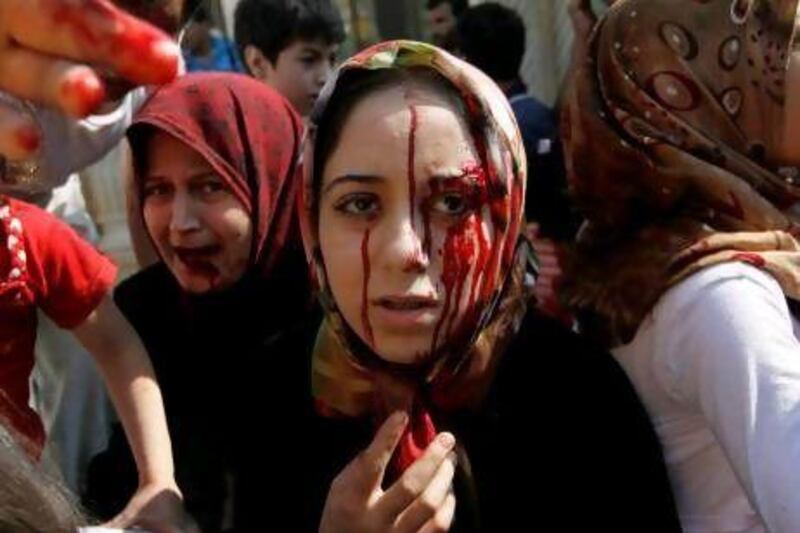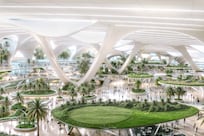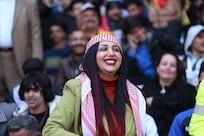DAMASCUS // No great soul-searching accompanied his transformation from peaceful demonstrator to rebel with the Free Syrian Army; it is a path many of his friends had already taken.
Arrested for protesting in the Damascus suburb of Dummar, Mohammed, 23, spent two months in an overcrowded military intelligence detention cell, and was released without charge to find demonstrations had been superseded by armed conflict.
"I wasn't thinking about taking up a weapon and fighting the regime when I left prison," he says.
"I went straight out to protest and saw the other opposition people in Dummar were now carrying rifles and I realised I had to do the same."
Since the start of the Syrian uprising, Mohammed had been part of the Local Coordination Committees, a network of activists organising peaceful demonstrations and tracking civilian deaths.
While the LCCs are still operating and peaceful demonstrations do still take place, Mohammed and other rebels in Damascus say circumstances have rendered the unarmed protests irrelevant.
"There are no more peaceful demonstrations, there's no point, we're not able to move a single metre before the security forces and army start shooting at us," he says.
Not all of those involved in the grassroots opposition movement agree, but a broad range of activists concede that those advocating peaceful revolt have been squeezed out by the demands of war.
Liberal, secular, often well educated members of the opposition say their influence over the uprising has been undermined, both through widespread use of indiscriminate violence by the authorities and mass arrests of peaceful dissidents, taking them out of circulation and leaving the field open to more radical groups.
On Sunday two prominent grassroots activists, Kifah Ali Deeb and Rami Hinawi, were detained by a Popular Committee - a pro-government armed militia - in their home neighbourhood of Sahnaya, south of Damascus.
Ms Deeb, an artist and author of children's books, sits on the governing board of the opposition National Coordination Committees, a political bloc that has called for non-violent democratic change in Syria.
The NCC has been at odds with other opposition factions, including the exiled Syrian National Council, which has called for foreign military intervention to aid rebels.
Ms Deeb, 30, is a member of the Alawite sect, which forms the nucleus of Bashar Al Assad's regime and dominates ultra-loyalist branches of the security forces and military.
Mr Hinawi, 33, who has long campaigned peacefully for democratic reforms alongside Ms Deeb, is a Druze.
Both are believed to be in the hands of air force intelligence, the most feared branch of the Syrian security forces, although, as with other detentions, no information has been released by the authorities in connection with the detentions.
Sectarian politics are complex in Syria but one of the key arguments made by supporters of Mr Al Assad is that his regime is all that protects Christian, Druze, Alawite and other minority groups from annihilation at the hands of the Sunni majority.
That has brought even sharper focus on members of those minorities who stand with the opposition, rather than the authorities.
Another influential advocate of a peaceful uprising in Syria, Mazen Darwish, also an Alawite, has been held by air force security for six months.
Although a civilian, he is facing prosecution in a military court usually reserved for army officers. There is no chance of appeal and no defence lawyer, proceedings are secret and the military judge can choose to issue a death sentence.
The human rights lawyer Anwar Al Bunni, a regular fixture at the Damascus courts of justice, said Mr Darwish and thousands of others facing special military courts had been thrown into a black hole, outside of Syria's regular - and highly flawed - legal system.
"They have had all of their basic rights taken from them, we know nothing about their situation, all the files are kept secret. We are not even allowed to know the names of all of those facing military trials," he said.
It emerged that Mr Darwish is facing a military court only when a judge summoned him to appear as a witness in another case, and air force security said they would not permit him to do so because he was being held for military trial.
Syrian officials do not talk about court cases but the authorities have long insisted they act in accordance with national laws and have dismissed evidence of widespread torture of detainees that has been compiled by the United Nations and rights monitors.
The use of draconian measures against advocates of non-violence has only accelerated the slide into an increasingly brutal conflict, one that rights monitors say has already killed upwards of 20,000 people, a majority of them civilians.
"By taking such extreme steps against the moderate opposition the regime is pushing all of its opponents to join the armed rebellion; the regime is making it clear there is no place for the peaceful activists," said a Syrian political analyst.
"The cases of Mazen Darwish, Kifah Ali Deeb and Rami Hinawi show very plainly the regime is not fighting militant Islamists but is actually at war with any advocates of real reform in this country, even those who insist on peaceful methods."
In Dummar, Mohammed admits he has little idea of how to wage war as a guerrilla, never having been in the army or taught how to fire a weapon.
A shortage of arms and ammunition among rebels in Damascus means he is used as a runner to convey messages between fighters when they are in action.
Nevertheless, he believes that is a more productive way of trying to overthrow the Syrian regime than stinging street protests.
"Our mistake was to ever believe there could be peaceful change in this country," he said. "We wasted time and sacrificed many lives trying to be peaceful. We should have just gone straight to an armed uprising."





